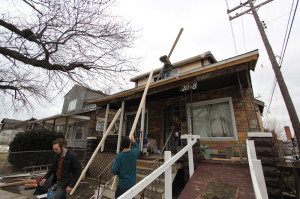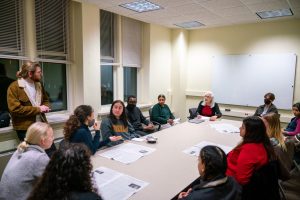Obies Rebuild Detroit Community Hub
February 8, 2014

Students traveled to Detroit for yet another Winter Term this January hoping to rebuild a city of lost jobs, industries and much of its population since the recent recession.
In an effort to restore the city’s communities, nearly 20 Obies found themselves in a small, rundown house on Broadstreet Avenue, located on Detroit’s west side. For generations, Auntie Na’s House has operated as the base for unofficial community outreach programs. According to College junior and trip organizer Jackson Kusiak, Auntie Na’s was a special place for many members of the community.
“[The house] could provide something as simple as a one-time meal or a substantial long-term place to stay,” said Kusiak.
In recent years, the house has fallen to shambles. For the duration of their trip, students worked with Auntie Na and other community leaders to restore the building. The work involved extensive repairs and remodeling, designed to enable Auntie Na to expand her outreach.
Oberlin’s involvement in Detroit communities began two years ago, when former student Jackson Koeppel left Oberlin to work for grassroots initiatives in the city.
Recalling last year’s trip, College Sophomore Hannah Rosenberg explained, “[Koeppel] brought down a group of students to do construction on a house which was to be turned into a green community center.”
According to Rosenberg, the planned renovation aimed to construct a coffee shop and provide examples of green living techniques to locals, but the project ultimately collapsed when the students found that the building was scheduled for demolition.
Despite the failure of last winter’s project, Oberlin students established connections with Auntie Na and other community leaders for projects in years to come. However, misfortune struck the group in its second year as Auntie Na unexpectedly fell ill and spent time in the hospital.
Even in Auntie Na’s absence, Oberlin students continued to complete major renovations to the house without her and found themselves growing in unexpected ways.
Alice Beecher, OC ‘13, noted that her relationships with fellow participants were strengthened due to the unforeseen circumstances.
“[I] was able to interact with people on a different level of intimacy than I had before,” said Beecher. “We were able to break down barriers erected by social positions.”
Beecher connects her time at Auntie Na’s to her continuing interest and involvement in labor movements. “I see a lot of the root of poverty as the result of the death of the labor movement in the United States,” she said.
Though Auntie Na’s House has been an invaluable community resource, Rosenberg points out that it is important to maintain a larger perspective on the group’s initiatives.
“This is the place to look at the difference between social change and social service. I do not think that this is creating massive social change yet, but it could,” said Rosenberg. “It is a social service she is providing, but if she gets these youth programs off the ground, that could contribute to social change.”
In an effort to continue their initiative in Detroit, Oberlin students plan to work with Auntie Na again. Kusiak is working to find additional funding for Auntie Na through grant proposals and web-based funding.
Despite two consecutive years of unanticipated obstacles, Oberlin students await another year in Detroit.
According to Kusiak, increased community gardening, the expansion of youth outreach programs and an increase in the number of computers for the community’s residents are planned for future projects.

























